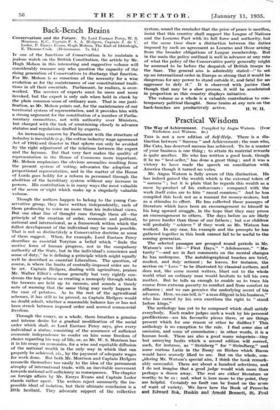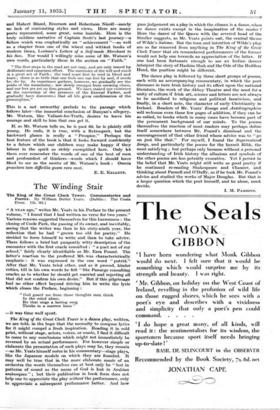Practical Wisd©m
The Way of Achievement. Compiled by Angus Watson. (Ivor Nicholson and Watson. 6s.) THIS is not a near edition of Self-Help. There is a dis- tinction between " Success " and Achievement ; the man who, lilce Cato, has deserved success has achieved. To be a master' of your business is one thing ; to attain its material rewards is quite another. He who has written a good book, though it be no " best-seller," has done a great thing ; and it was a victory to have made the speech on conciliation with America though it turned no votes.
Mr. Angus Watson is fully aware of this distinction. He has indeed gained the wealth which is the external token of " success " ; but it is plain that he regards this wealth as a mere by-product of his endeavours : compared with the work itself coins are to him " rascal counters." And he has compiled this book not as a manual for money-makers, but as a stimulus to effort. He has collected those passages of literature -which have been an encouragement to himself in his long upward struggle, in the hope that they may prove an encouragement to others. The days before us are likely to prove harder than those of our fathers ; but oar children will probably " achieve " if they -work as Mr. Watson has worked. In any case, his example and the precepts he- has gathered together in this book cannot fail to be useful to the coming generation.
The selected passages are grouped round periods in Mr. Watson's own life—" First Days," "Adolescence," " Ma- turity "—and are in fact comments on the mental changes he has undergone. The autobiographical touches are brief, modest, and duly reticent ; rue leaves, for instance, the section on " Love r to be illustrated by classical• authors, and does not, like some recent writers, blurt out to the whole world what an ordinary man would hesitate to tell his own mother. But. he tells us enough. to enable us to trace his course from ,extreme poverty.to comfort and from comfort to affluence ; and we can perceive the underlying secret of his advance. Here, we can tell, is " a man diligent in his business," who has earned by his own exertions the right to " stand before kings."
The anthology has yet to be composed which shall satisfy everybody. Each reader judges such -a work by his personal predilections—are his favourite pieces there, or are things present which for one reason or other he dislikes ? This anthology is no exception to the rule. I find some sins of omission, and some of' commission ; in other words, it is a human book. There are also a good many misprints—tiny "but annoying faults which a second edition will correct, such, for instance, as " Strinberg " for " Strindberg," and 'some curious Latin in the -Essay on Riches which Bacon would have scarcely liked to see. But on the whole, con- sidering Mr. Watson's special aim, I think the book remark- ably successful. There are about a hundred selections, and I do not imagine that a good judge would wish more than perhaps a dozen away. The rest are either literature or -worthy to be so ; and, what is here more to the point, they are helpful. Certainly no fault can be found on the score of want of variety. We have here the Book of Prove: bs and Edward Bok, Ruskin and Arnold Bennett St. Paul and Hubert Bland, Emerson and Robertson Nicoll—surely no lack of contrasting styles and views. Here are many poets represented, some great, seine humble. Here is the truly sublime narrative of Captain Scott's last journey—a failure which was emphatically an " achievement "—as well as a chapter from one of the wisest and wittiest books of modern tunes, Lorimer's Letters of a Self-made Merchant to his Son, Nor would I willingly miss some of Mr. Watson's own words, particularly those in the section on " Faith."
" The first steps in the road are not easy, and are only traced by deliberate and conscious effort. The surrender of the will and mind is a great act of Faith ; the road must first be trod in blood and tears ; there is so little that one feels one can live by and, if needs be",* die by. As experience gathers, however, we gradually see the peaks of the mountains ; law slowly emerges from seeming chaos, and our feet are set on firm ground. We have staked our existence on the conviction of the presence of, the Eternal Father, and gradually have discovered that all life gives confirmation of the presumption."
This is a not unworthy prelude to the passage which follows later—the immortal conclusion of Bunyan's allegory. Mr. Watson, like Valiant-for-Truth, desires to leave his courage and skill to him that can get it.
If, as Mr. Watson tells us, he is past 60, he is plainly still young. He ends, it is true, with a Retrospect, but the backward glance is really a " Prospice." Perhaps the best feature of the book is that it looks forward confidently to a future which our children may make happy if they labour in the spirit so richly exemplified here. Only let them ever remember the words of one of the best of men and profoundest of thinkers—words which I should have E. E. KELLErr.







































 Previous page
Previous page